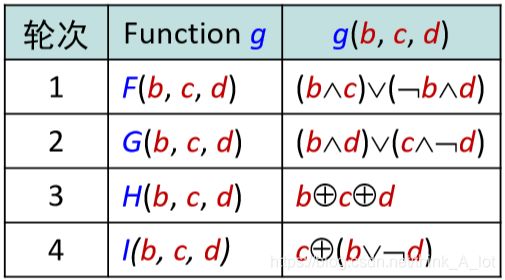MD5加密算法(C++版)
此算法使用C++写成。更多详细内容可参考GitHub项目
模块分解
①填充字符串函数:在长度为K bits的原始消息尾部填充长度为P bits的标识(1000…00),其中1 <= P <= 512(即至少需要填充一个bit),使得填充后的消息位数为 K+P ≡ 448(mod 512)。注意,当K ≡ 448(mod 512)时,填充的字节数 P = 512 bit。填充得到上述消息后,在尾部附加K值的低64位,最后得到一个长度为 K+P+64 ≡ 0(mod 512)的消息。
②字符串分块函数:将填充好的字符串分割成L个长度为512bit的分组
③循环压缩函数:对每个512-bit分组进行64轮迭代运算
(1)对分组(A,B,C,D)中的A进行迭代运算
公式为:A <= B + ((A + g(B,C,D) + X[k] + T[i])) << S[i]
其中:
· A,B,C,D代表MD5缓冲区当前的数值
· g为轮函数,1-16轮迭代使用F函数,17-32轮迭代使用G函数,33-48轮迭 代使用H函数,49-64轮迭代使用I函数
· X[k]代表当前处理消息分组的第k个32位字,X[k]由第n轮迭代对应的顺序表决定
· T[i]代表T表的第i项的值,T[i] = int(2^32 * |sin(i)|)
· S[i]对应第i轮的左循环移位的s值
(2)对分组(A,B,C,D)作循环轮换
公式为:(B,C,D,A)<=(A,B,C,D)
④MD5编码函数:用于调用前面的功能函数进行MD5编码
(1)输入待加密的明文字符串
(2)对明文字符串进行填充
(3)对填充后的明文字符串进行分块(Yq)
(4)使用预设的初始值初始化MD5缓冲区间(IV)
(5)对各个分块字符串利用公式HMD5(CVi-1, Yi)进行循环压缩,运算结果作为下一块的输入(CVi)
当所有的分块迭代完成后,输出结果CVL,L表示最后一个分块的序号
循环压缩函数迭代部分的步骤分解
1. 64轮迭代
2. 单次迭代的计算步骤
3. 4轮循环所使用的生成函数
C++代码
#include 

